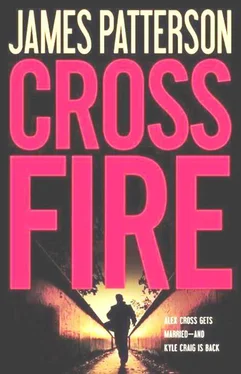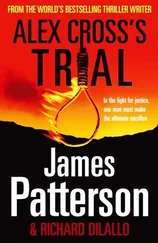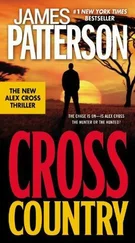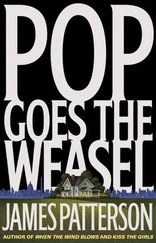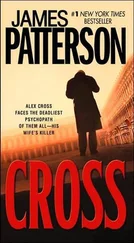So on the seventh day of no action, Denny told Mitch it was time to go again.
They were driving on Connecticut, away from Dupont Circle in rush-hour traffic, which was perfect, as it turned out. The longer it took to crawl past the Mayflower Hotel, the more they could scope it out on the first pass.
“That the place?” Mitch asked, looking up from the passenger seat.
“We’ll do a full recon tonight,” Denny said. “Tomorrow night, we go.”
“What kind of crumbum we bringing down this time, Denny?”
“You ever heard of Agro-Corel?”
“Nope.”
“You ever eat corn? Or potatoes? Or drink bottled water? They were into everything, man, a whole vertically integrated conglomerate, and our boy sat right at the top of the pyramid.”
“What’d he do?”
Mitch kept picking Taco Bell crumbs out of his lap and eating them, but Denny knew he was listening, too, even if some of it went over his head.
“Man lied to his company. Lied to the Feds, too. He sent the whole place down the shitter and took some hundred-million-dollar parachute, while everyone else took the shaft – no pensions, no jobs, nothing. You know what that’s like, don’t you, Mitchie? Doing everything you should, and still getting the short end while the Man just keeps getting fatter?”
“Why ain’t the Man in jail, Denny?”
He shrugged. “How much does a judge cost?”
Mitch stared out the windshield, not saying anything. A light changed, and the traffic surged forward again.
Finally, he said, “I’ll put a bullet in his brain stem, Denny.”
THE NEXT NIGHT, they did things a little differently, trying to shake up the routine. Denny dropped Mitch off with both packs in an alley behind the Moore Building, then parked a good four blocks away and walked back. Afterward he’d pull the car around again.
Mitch was waiting inside the building. Neither one of them spoke while climbing the twelve flights of stairs. The packs were sixty pounds each. It wasn’t a picnic anyway.
On the roof, they could hear traffic noises from down on Connecticut but could see nothing until they got right up to the edge.
The whole facade of their building was built up, so all anyone could see from the street was a twenty-foot-high triangle of brickwork instead of the usual flat roofline. The spot was like a bird blind, with a perfect view of the Mayflower Hotel across the street – still one of the most famous hotels in DC.
Denny scoped things out while Mitch got himself set up for the turkey shoot.
The target, Skip Downey, had some very regular habits. He liked one suite in particular, which made Denny’s job a hell of a lot easier than it might have been.
Right now, the curtains were open, which meant Mr. Downey hadn’t checked in yet.
Twenty minutes later, though, Downey and his “friend” were waiting around for the bellman to take his twenty-dollar tip and skedaddle out of the suite.
Downey had an embarrassing reddish-blond comb-over to go with his million-dollar bank account. And apparently he liked the Mensa type. His companion today had her hair up in a bun, with heavy horn-rimmed glasses and a little business suit that was way too short for any real librarian to wear.
“Bow-chicka-wow-wow,” Denny sang – a little porn theme for the occasion. “Two windows down and four over – you got it?”
“I’m there,” Mitch said. He was eyeing over his own scope and flipped off the safety as he watched. “Nice-looking piece of ass, Denny. Shame to mess her up, you know?”
“That’s why you’re just going for the shoulder, Mitchie. Just enough to put her down on the ground. Mr. D. first, and then the girl.”
“Mr. D. first, and then the girl,” he repeated, and settled into his final stance.
Downey poured a couple of scotches on rocks. He drained his own and then walked straight over to the suite’s living room window.
“Shooter ready?” Denny asked.
“Ready,” Mitch said.
The man of the moment reached up to close the heavy coffee-colored drapes, his arms spread in a wide V.
“Send it!”
AT TEN THIRTY that night, I was standing on the roof of the Moore Building, looking across to the hotel suite where Skip Downey had just joined a small but growing fraternity of those recently deceased by sniper fire.
This latest made three incidents – the magic number. Our guys were now serial killers in the public eye.
Connecticut Avenue down below was a forest of mobile broadcast towers, and I knew from experience that the blogosphere was about to officially catch on fire with this thing.
“Can you see me?” I said into my radio.
I had Sampson on the wireless, from inside the hotel room. He was standing right where Skip Downey had gone down.
“Wave your arm or something,” he said. “There you are. But, yeah – that’s pretty good cover.”
Someone behind me cleared his throat.
I wheeled around and saw Max Siegel standing there. Great. Just who I didn’t want to see.
“Sorry,” he said. “Didn’t mean to scare you.”
“No problem,” I said. Unless you counted the fact that he was up here at all.
“What have we got?” He came over to get the same view I had, and looked out across Connecticut. “How far a shot is that? Fifty yards?”
“Less,” I said.
“So they’re obviously not trying to top themselves. At least, not in terms of distance.”
I noticed he said “they” and wondered if he’d been on that FIG conference call – or if he’d come up with it on his own.
“The MO’s the same otherwise,” I said. “The shots came from a standing position. Caliber seems like a match. And then there’s the target profile, of course.”
“Bad guy out of the headlines,” he said.
“That’s it,” I said. “Plenty of people got screwed over by this Downey guy. The whole thing has vigilante justice written all over it.”
“You want to know what I think?” Siegel asked – of course, it wasn’t really a question. “I think you’re oversimplifying. These guys aren’t hunting, not in the traditional sense. And there’s nothing personal in the work at all. It’s completely detached.”
“Not completely,” I said. “That print they left at the first scene had to have been deliberate.”
“Even if it was,” Siegel said, “that doesn’t mean the whole thing was their idea.”
Already I was getting tired of the jawing. “Where are you going with this?”
“Isn’t it kind of obvious?” he said. “These guys are guns for hire. They’re working for someone. Maybe there’s an agenda – but it belongs to whoever’s footing the bill. That’s who wants all these bad boys dead.”
He had laid out his opinion as fact, not to be questioned – as usual. But, still, the theory wasn’t completely off the wall. I owed it to myself to consider it, and I definitely would. Score one for Max Siegel.
“I’m a little surprised,” I told him honestly. “I’m used to the Bureau sticking to harder evidence and staying away from supposition.”
“Yeah, well, I’m full of surprises,” he said, and put an unwelcome hand on my shoulder. “You’ve got to widen your mind, Detective, if you don’t mind my saying so.”
I minded very much, but I was determined to do the one thing Siegel seemed incapable of – taking the high road.
I LEFT THE MAYFLOWER crime scene soon after that, glad for an excuse to get away from Siegel.
Our second victim that night, Rebecca Littleton, was at George Washington University Hospital with a single gunshot wound to the shoulder. Word from the emergency room was that it had been a penetrating trauma, as opposed to a perforating one. That meant the bullet still had to come out. If I hurried, I could catch her before surgery.
Читать дальше
